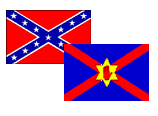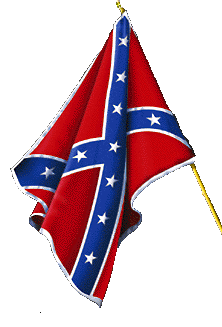THE ULSTER-SCOTS AND THE SOUTHERN
CONFEDERACY
Alex Greer
On both sides of the Atlantic there has been an avalanche of books and articles, both scholarly and popular, which have been about the American Ulster-Scots or 'Scots-Irish' -(1). For example the Ulster Society's Ronnie Hanna has written many readable biographies on notable Americans of Ulster-Scots lineage. The Newsletter's Billy Kennedy has given the average reader a greater understanding of our American kinfolk in his state-by-state series on the Ulster-Scot settlements. Interestingly, three out of four of the Kennedy books are about the Ulster-Scots in certain states, which became part of the southern Confederacy in 1861. What was the relationship between the Ulster-Scots and the short-lived Confederate States of America? To answer this question one must recount American history from colonial times.
In the early 1700s roughly 50,000 Ulster-Scots left the ports of Belfast, Larne and Londonderry for the New World. Like their ancestors who had crossed the North Channel in the early 1600s, the Ulster-Scots came to America as groups of extended families (or "clans"). Also like their ancestors, these Ulster-Scots crossed the Atlantic for the same varied reasons. Being Presbyterian non-conformists at odds with the Anglican establishment, they sought greater religious liberty. They also aspired to own the soil, which they would till. The open spaces of the North American continent offered opportunities, which were lacking in the landlord gentry dominated societies in Ireland and Britain. The historic American stereotype of the self-reliant extended pioneer family (or clan), armed with their Bibles and muskets, is in part that of the Ulster-Scots.
Upon arrival in the 13 colonies, the Ulster settlers found that much of the land in the coastal regions had already been settled by the English, the Germans and by other European settler groups. On the coastal plane of the southern colonies in particular, (and this region is also known as the "tidewater"), land and politics were dominated by a Cavalier English-descended plantation-owning gentry. Most Ulster-Scots entered America by way of the port of Philadelphia. American historian Madison Grant, wrote in his classic 1933 work The Conquest of a Continent, that as the Ulster-Scots sought "newer and freer land" they "began to follow the mountain valleys trending southwestward from Pennsylvania."(2) These routes took the Ulster-Scots to the Shenandoah Valley in western Virginia, and the back country (or "Up Country") of the Carolinas. My own clan contributed to this migration. (3) There is a City of Greer (originally Greer's Station) in the South Carolina Up Country. As their numbers grew, due to high birthrates, branches of successive generations of Ulster-Scots families (or clans) loaded up the wagons for new frontiers further west.
After the American War of Independence, which the Ulster-Scots played a major role in fighting for the Patriot side, the hills of Tennessee and Kentucky were calling for a new generation of American-born Ulster Scots. In this migration there emerged many developments at which the Ulster-Scots would leave their mark on American culture, and the culture of the South in particular. In helping to create music styles such as country and bluegrass, the Ulster-Scots contributed much to American folk culture. In religion, many frontier Ulster-Scots became Methodists and Baptists due to many roving revival preachers. Further south other Ulster-Scots poured into Alabama, Mississippi and Louisiana. Further west other Ulster-Scots staked their claims in Texas, and made their stand at the Alamo in 1838. On the eve of the War Between the States in 1861, the Scots-Irish were well established in many states, which would secede from the still young union, but also in many states, which would remain in the union.
Prior to the War, there were varied attitudes among the Ulster-Scots Americans over the growing divergence between the northern and southern states. As family farmers in the Up Country they were conscious of their kinfolk across the Mason-Dixon line, and they did not wish to be cut off from them. Also they rarely saw eye-to-eye with the tidewater Cavalier gentlemen who had initiated secession in the Carolinas, and later in Virginia. As to the issue of Negro slavery, which was actually one of a number of issues between the North and the South, the Ulster-Scots on both sides of the Mason-Dixon line were divided. Some Ulster-Scots (including some of this author's clansmen) owned slaves, and Presbyterian theologians like R.L. Dabney defended slavery, while others had called for immediate abolition. Most Ulster-Scot-descended Americans probably wanted to see slavery abolished, but they wanted to see abolition carried out in a peaceful and gradual manner. (President James Buchanan, from Pennsylvania, was of this view as he tried to avert war in the 1850s.) The Southern Ulster-Scots were also loyal to their respective states, they believed in limited constitutional government, and they believed in the United States as a confederal republic and not as a coercive empire. Decades before the war, one major champion of states rights was Ulster-descended John C. Calhoun of South Carolina, although he was at odds with another Ulster-Scot, President Andrew Jackson.
When the first southern states, (South
Carolina, Georgia, Florida, Alabama, Mississippi, and Louisiana), pulled out of
the union early in 1861, the Ulster-Scots were apparently divided over secession. South Carolina was the
first to secede, but it was the Low Country gentry which had initiated that
state's secession. The Up Country Ulster-Scots had had reservations. By mid-1861
North Carolina, Virginia, Texas, Arkansas and Tennessee seceded. In Virginia,
the Ulster-Scots in some of the western counties refused to acknowledge
secession, which had been pushed for by the tidewater gentlemen. Thus a new
state, West Virginia, was formed. The factor, which caused many Ulster-Scots to
eventually support, and fight, for the Confederacy, was the coercive policy of
President Abe Lincoln. When Arkansas, a state with a large Scots-Irish
population, was asked by Lincoln to contribute troops to force the seceding
states back into line, Arkansas joined the Confederacy. Tennessee, the largely
Ulster-Scots 'Volunteer state', also rejected Lincoln's call to arms in the
spring of 1861, and thus became the last state to join the Confederate States of
America. Whatever their differences with the tidewater English the back country
Ulster-Scots closed ranks as fellow Southerners to defend their new
independence, even if it meant fighting their kinfolk from the northern states.
Also, it would appear that the Ulster-Scots gave the Confederacy one of its
enduring symbols, the star-charged-blue satire on white and red background. This
flag is based on St. Andrew's Cross.
Ulster-Scots were apparently divided over secession. South Carolina was the
first to secede, but it was the Low Country gentry which had initiated that
state's secession. The Up Country Ulster-Scots had had reservations. By mid-1861
North Carolina, Virginia, Texas, Arkansas and Tennessee seceded. In Virginia,
the Ulster-Scots in some of the western counties refused to acknowledge
secession, which had been pushed for by the tidewater gentlemen. Thus a new
state, West Virginia, was formed. The factor, which caused many Ulster-Scots to
eventually support, and fight, for the Confederacy, was the coercive policy of
President Abe Lincoln. When Arkansas, a state with a large Scots-Irish
population, was asked by Lincoln to contribute troops to force the seceding
states back into line, Arkansas joined the Confederacy. Tennessee, the largely
Ulster-Scots 'Volunteer state', also rejected Lincoln's call to arms in the
spring of 1861, and thus became the last state to join the Confederate States of
America. Whatever their differences with the tidewater English the back country
Ulster-Scots closed ranks as fellow Southerners to defend their new
independence, even if it meant fighting their kinfolk from the northern states.
Also, it would appear that the Ulster-Scots gave the Confederacy one of its
enduring symbols, the star-charged-blue satire on white and red background. This
flag is based on St. Andrew's Cross.
Having joined the Confederacy the Ulster-Scots were more than ready to fight. The most notable southern Ulster-Scots personality was Lieut.-General Thomas J. "Stonewall" Jackson. Jackson was very conscious of his roots as his biographer and chaplain R.L. Dabney pointed out in an 1867 biography. Sadly, Jackson was shot to death by one of his own men who mistook his patrol for a Union patrol at the Battle of Chancellorsville, Virginia, on 10 May 1863. Jackson, along with the English-descended General Robert E. Lee (who had paid tribute to the Ulster-Scots), was a respected example of a Christian gentleman for future generations of Southerners. There were many units of the Confederate States Army which had a distinctly Ulster-Scots reputation, such as the 33rd and 42nd Virginia Infantry Regiments. I should take pride in that there was a Tennessee Calvary unit known as "Greer's Regiment". Colonel Hamilton Jones, the Commanding Officer of the 57th North Carolina Infantry Regiment, wrote years after the war that "the high-spirited Scotch-Irish of North Carolina were unsurpassed in the qualities that go to make good soldiers. They do their duty well and valorously, and in fighting, in common with their comrades, they have fixed a standard for the American soldier below which it is hoped he will never fail."(4)
The cause of the South did not end with its military defeat. There was a task of rebuilding a war-shattered economy, and dealing with the injustices of a Union-imposed "reconstruction" regime. Ulster-Scots Southerners were among those involved in the South's fight for survival in the dark times after the War Between the States.
(To be continued in my next article).
--------------------------------------------------------------------------------------------------------------------------------------------
1) The Ulster-Scots in America have been known as the "Scotch-Irish" or "Scots-Irish" from the time of their settlement. The English-descended Americans on the coasts coined this term because they were Scots, but they had come from Irish ports.
2) Quoted from R. Peterson, The Racial Origins of the Founders of America: Extracted and Condensed from the works of Madison Grant and Ales Hrdfclua, Washington DC: Scott-Townsend Publishers, 1995, p.49.
3) See the Grierson World Project website at :www.geocities.com/Heartland/Park/7403/
4) See the website: www.scotchirish.net There are other websites of interest regarding the South and the American Ulster-Scots. For the Southern viewpoint on the War Between the States see www.truthinhistory.org For current events see the Council of Conservative Citizens site at www.cofcc.org, and the League of the South at www.dixienet.org For books on the South see www.virginiagentleman.com The Scotch-Irish Society of the USA is at www.scotch-irishcentral.org
For an interesting article on Ulster and Irish involvement in the Confederate army click here.
home page